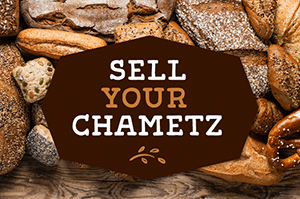Bonjour [nickname_else_first_name],
Le moment est venu où l'une des fêtes les plus importantes du calendrier juif résonne avec l'IDENTITÉ de chaque juif. Celle de la LUTTE sous OPPRESSION à la DÉLIVRANCE à la LIBERTÉ.
C'est particulièrement vrai avec tout ce qui se passe dans le monde ces jours-ci...
Venez célébrer PESAH avec nous en tant que COMMUNAUTÉ
Le calendrier des horaires de Pâque est le suivant
Veuillez noter que les mis à jour des horaires/informations (si le cas) seront fournis avec les bulletins hebdomadaires.
Jeudi matin 10 avril
Ta'anit Be'horot (jeûne des premiers-nés)
Jeûne des premiers-nés la veille de Pessa'h. Ce jeûne commémore le miracle qui a épargné les premiers-nés juifs de la peste qui frappait les premiers-nés égyptiens.
Shaharit à 7h avec la Spanish
Suivi d'un Siyoom pour les premiers-nés mâles (lecture de la Guemara au lieu du jeûne).
Les premiers-nés mâles doivent jeûner jusqu'au Seder, sauf s'ils participent à un repas de mitsva, par exemple une Brit Milah, un mariage ou un Siyoom d'un traité (Mishna, Guemara, Talmud).
C'est une mitsva très respectée au sein de notre communauté libanaise.
Si l'aîné a moins de 13 ans (Bar Mitzvah), le père se rend généralement à la synagogue.
Jeudi soir 10 avril Bedikat 'Hametz après 20h23
La bénédiction est Baroukh Ata Hachem… Al Biur 'Hametz
VENDEZ VOTRE 'Hametz en ligne avant 22h00
CLIQUEZ ICI POUR VENDRE VOTRE 'Hametz en ligne
LE 'Hametz sera vendu.
VENDREDI 11 AVRIL AVANT 10H
Vendredi matin 11 avril Brûlage du 'Hametz avant 11h35
Chabbat matin 12 avril
Ce Chabbat est SHABBAT HAGADOL, Chabbat Parashat Tzav.
Exceptionnellement, ce Chabbat, les prières auront lieu plus tôt que d'habitude, à 7 h.
Immédiatement après la Tefila (vers 9 h), un léger Kidouch 'Hametz sera servi.
La raison est que le 'Hametz doit être terminé pour 10 h 16.
Fin de la consommation du 'Hametz avant 10 h 16.
- Matin de Chabbat 12 avril. Annulation du 'Hametz avant 11 h 35. « Kal 'Hametz… »
Minha/Arbit - 19 h
- Allumage des bougies du 1er Seder : Motzai Chabbat 12 avril après 20 h 23
- Consommation de l'Afikoman avant minuit.
- 2e Jour dimanche 13 avril
Shaharit 9AM
Minha/Arbit - 19 h
2emeSeder
Allumage des bougies après 20 h 25 et début du compte de l'Omer le soir.
- Lundi 14 avril
Shaharit 9AM
Motzai ‘Hag
Minha/Arbit - 19h15
Havdala après 20h26
- Vendredi 18 avril au soir
Minha/Arbit - 19h30
Allumage des bougies avant 19h26
- Samedi 19 avril Hag
Shaharit 9AM
Minha/Arbit - 19h
Allumage des bougies après 20h34
- Dimanche 20 avril
Shaharit 9AM
Motzai ‘Hag (Mimuna pour ceux qui célèbrent)
Minha/Arbit - 19h30
Havdala et consommation du ‘Hametz uniquement après 20h35







